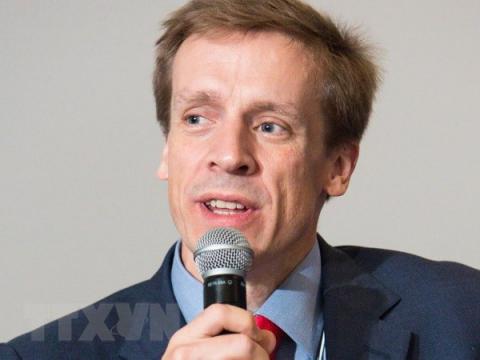WEF ASEAN: VN needs to seek new competitive edge in Industry 4.0
VGP – Viet Nam and other countries at the same level of development should no longer see cheap labour as a strategy to maintain competitive edges in the market, said Justin Wood, Head of Regional Agenda - Asia Pacific and member of the Executive Committee of the World Economic Forum.
 |
|
Justin Wood, Head of Regional Agenda - Asia Pacific and member of the Executive Committee of the World Economic Forum. Photo: WEF |
Seeking new competitive advantages in the era of modern technology is a major policy issue for Viet Nam and ASEAN at large as cheap labour is no longer a feasible strategy, he said.
Mentioning the WEF ASEAN 2018, Wood said the WEF had signed with the Government of Viet Nam an agreement on the organization of WEF ASEAN since January 2017.
Such an important event needs a great deal of time for preparation, he said, adding that one important work was to decide its theme “ASEAN 4.0: Entrepreneurship in the fourth industrial revolution”.
This year’s WEF will feature 53 sessions, he said, adding that more than 900 participants are due to join the forum, including delegates from the public, governmental, private and civil society sectors as well as entrepreneurs, experts, and policy makers from over 40 countries.
It is expected to welcome over 90 governmental representatives, and eight Presidents and Prime Ministers.
With the theme of “ASEAN 4.0, entrepreneurship and the Fourth Industrial Revolution,” this year’s WEF will focus on the significance of the Industry 4.0 to the 10 ASEAN member countries, seeking answers to the questions of how changes brought by the Industry 4.0 should be understood and what actions ASEAN leaders should take.
Wood stressed that the Industry 4.0 affects all countries in the world, from the richest and most modern to the poorest and least developed. However, new technologies will bring about different impacts in different countries, which is the subject of study.
The era of new technologies has posed major policy questions, and the upcoming WEF-ASEAN will provide an opportunity to discuss and understand better the steps to be taken next, the WEF official said.
The WEF was established in 1971 as a non-profit foundation and is headquartered in Geneva, Switzerland. The forum engages the foremost political, business and other leaders of society to shape global, regional and industry agendas.
Founded in 1967, the ASEAN groups Brunei, Cambodia, Indonesia, Laos, Malaysia, Myanmar, the Philippines, Singapore, Thailand and Viet Nam./. – WEF.

